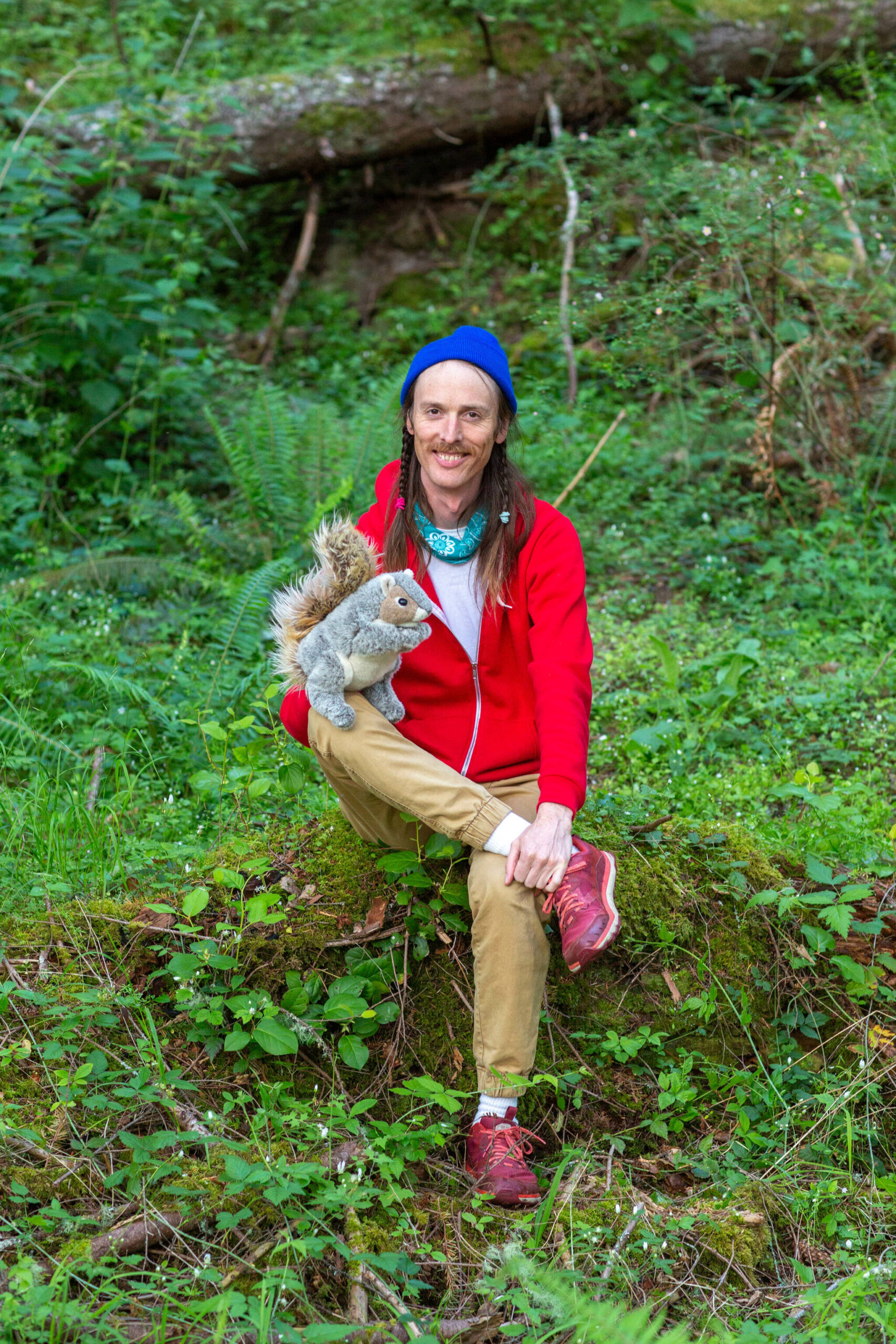Sometimes all it takes is a squirrel in the middle of the woods to spread an enduring message of hope and acceptance.
Evan Wagoner-Lynch was isolated and experiencing a mental health crisis in the spring of 2020. He pulled out a thrift store puppet from his closet and began making videos in the forests of Orcas Island, initially as a way to work through his own feelings. He started posting them on social media sites, and by 2022, the Squirrel Dialogues had more than 250,000 subscribers on TikTok and has now been seen over 10 million times.
Squirrel’s first question in the videos is typically: Where is it in your body?
“It’s a prompt I’ve learned from somatic therapies and meditations,” explained Wagoner-Lynch, who has a background in writing and performance art. “‘Somatic’ meaning ‘of the body.’ Much of Squirrel’s work is about gently guiding people back to their own bodies. If trauma is ultimately a disconnection from the self, then reconnection to the self is the opposite of trauma, aka ‘healing.’”
Squirrel’s popularity on TikTok was surprising for Wagoner-Lynch.
“I didn’t do anything to promote it. It got picked up on the algorithm and people really liked the videos so suddenly I had this big audience. It was really exciting and kind of scary,” he said. “It was what I had always wanted — to share this project with people. The TikTok audience is very communicative and vulnerable so they are upfront about what they are struggling with. I got a sense of the scale of need for mental health content. Many feel safe with the squirrel character because he isn’t a person. Squirrel helps them to feel their feelings. He offers them a different way of looking at themselves that is more healing and compassionate.”
All of his recordings are done against the backdrop of the island’s forests, beaches and lakes, which has been an important component of their appeal. In inclement weather, he records in his car.
“I am able to bring people to Orcas through the project. It’s very calming and healing for people just to see the woods here. The lighting is so gorgeous that people have asked me if it’s fake!” laughed Wagoner-Lynch.
He has received thousands of messages from his viewers across the world. For those who express suicidal ideation, he refers them to mental health services. He is often told, “Squirrel saved my life.”
“The first time I heard that it blew my mind,” he said. “It’s a big thing to hear from someone. If I sit with that, I am very grateful to have stumbled across this work and be able to do it for people.”
Wagoner-Lynch moved to Orcas seven years ago from Oakland, California, where he performed street theatre and comedy.
“I came here basically to crash land and heal. I had hit a wall in California and needed to start over,” he said. “There’s something very beautiful about taking my own trauma and suffering and transforming it into healing art and then being able to help other people with what happened to me. It helps me to accept my own story and to heal myself.”
This past year, Wagoner-Lynch devoted himself full-time to Squirrel Dialogues. In addition to his robust number of TikTok followers, he has 100 Patreon supporters and 1,000 Youtube Subscribers.
This fall, he is heading to Evergreen State College in Olympia to finish his degree and study education, psychology and media. He is considering two year-long intensive programs: Gateways, a prison co-learning program in partnership with a juvenile facility in Chelalis and the Changemakers Lab, an incubator for social entrepreneurship and non-profit activism.
“I’ve realized this is a vocation for me. I believe it’s the work I am meant to do,” Wagoner-Lynch said. “There’s no obvious job or career associated with this so my plan is to go back to school to grow myself as an artist. My desire is to become a more skillful artist and healer and reach more people.”
He is currently fundraising for the transition as well as looking for a more reliable vehicle and a place to live in Olympia. For more information or to donate, visit https://squirreldialogues.com/.
“Thank you to Orcas Island — the community and the land itself. Orcas has made all of this possible. This wouldn’t have come together anywhere else,” Wagoner-Lynch said.




